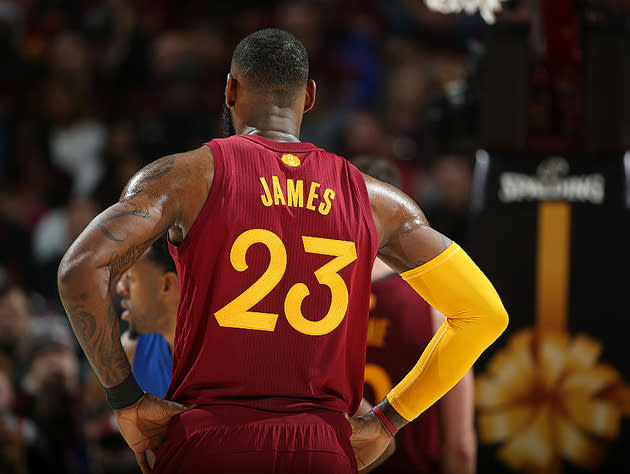LeBron James joins the movement: 'I'm not a fan of the two-minute report'
LeBron James, a day after Kevin Durant ripped on the NBA’s process and a month after former teammate Dwyane Wade dug in, has come out to criticize the league’s move to release “Last Two Minute Reports.”
[Sign up for Yahoo Fantasy Basketball | Mock Draft | The Vertical | Latest news]
[Join a Yahoo Daily Fantasy Basketball contest now | Free NBA Yahoo Cup entry]
The Reports are available at the league’s website for perusal just about daily, and they detail the refs’ work down the stretch of close games, either citing blown calls or non-calls or confirming that the referees working a particular game made the correct call (or, no call at all).
James, in the wake of a contested final two minutes of his team’s win over the Golden State Warriors on Sunday, is just the latest to speak out against what many see as either a pointless priority at best, from the NBA, or at worst an undermining resource that does far more harm than good.
LeBron, who has done this before, had at it via ESPN’s Dave McMenamin:
“I’m not a fan of the two-minute report,” James said after the Cavs practiced on Wednesday. “I think it discredits what the referees are doing for 48 minutes. If that’s the case, you might as well do a 48-minute report.
“It’s not fair to the referees that you only talk about the final two minutes of the game and not the first 46. There’s plays that’s missed, there’s plays that called throughout 48 minutes that don’t get talked about.”
Referee reports do not include the initial 46 minutes of the game because those reports would run rather long, and few would consistently utilize the available resource and read them. Few read the Two Minute Reports as it is, unless something has gone terribly wrong in a very public way, which is where the problem partially stems from.

[Follow Ball Don’t Lie on social media: Twitter | Instagram | Facebook | Tumblr]
[Follow Dunks Don’t Lie on Tumblr: The best slams from all of basketball]
Not before the referees themselves, long a critic of the process, stepped in to remind us:
We agree with Kevin Durant – the L2M report unfairly targets NBA officials, and reform is needed. https://t.co/aFekGkaxNi pic.twitter.com/lPbhyg5Vt1
— NBA Referees (@OfficialNBARefs) December 28, 2016
Many seem to be missing the point, here, though. The NBA doesn’t release this information to play “gotcha” with the referees, washing their hands of the blown calls or non-calls and walking away from the mess these terrible, no-account referees just made.
No, the league releases this info because it helps the consumer – players, media, teams, fans, name it – understand just how the league expects certain plays to be called.
For the sheer amount of hours NBA fans put in watching their favorite league, and even for the sheer amount of time its players and coaches work within the game’s confines, there is still quite a bit of teaching to do when it comes to understanding what the league wants whistled, and what it doesn’t.
This is where the reports come in. To help us, not to chide the refs or absolve an organization of fault.
And, as is often the case with instances like this, the onus is on us as consumers and observers to pay as much attention to the reports that don’t cause controversy – the ones that detail why the referees did as the NBA expects, with no “blown call” angle to work with – as we do the reports that point out that Richard Jefferson tripped the NBA’s third most-famous player on a Christmas Day game on ABC in the final seconds of a one-point contest.
Because reading through those other reports – ones that make up 98 percent of the league’s releases (shock horror: NBA referees pitch far closer to a perfect game than you think, nightly) – is no fun, we will continue to misuse the information, and only tell part of the story. That’s on all of us – the league, the referees, the players, consumers and especially the media.
– – – – – – –
Kelly Dwyer is an editor for Ball Don’t Lie on Yahoo Sports. Have a tip? Email him at KDonhoops@yahoo.com or follow him on Twitter!


